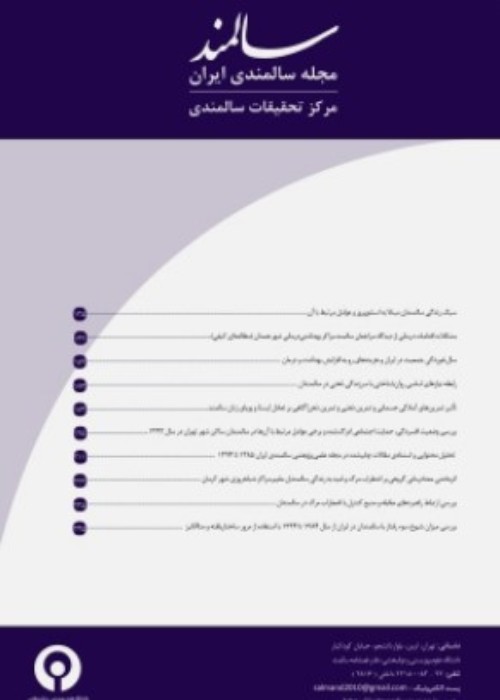Investigating Social Vulnerability of the Elderly in the Earthquakes of Bam, Varzaghan, and Ahar
Author(s):
Abstract:
Objectives Although the earthquake is a natural disaster, it has become a social subject and has created vulnerable groups due to its various social effects. One of these groups is the elderly. The present study aimed to investigate the social vulnerability of elderly people who experienced earthquakes.
Methods & Materials The present study involved a cross-sectional qualitative-quantitative method. The population comprised all the elderly people in Kerman and East Azarbaijan provinces. In the qualitative part, in order to identify the social problem of elderly who experienced an earthquake, Categories has been collected By focus group. For this purpose, 17 people were selected by purposive sampling method for focus group of elderly and the social damage of the earthquake was determined. In the quantitative phase, 90 older people who have experienced the earthquake in Bam, Varzaghan and Ahar were selected randomly, and 90 older people who have not experienced an earthquake were selected and matched with the first group. Both groups answered the questionnaire on social isolation, social support, social adjustment questionnaire, and MarloweCrowne Social Desirability Scale. The collected data were analyzed by SPSS software (version 21) and t-test.
Results In the qualitative part, social damage of earthquakes, including social incompatibility, social isolation, lack of social acceptance and lack of social support were identified through interviews. In the quantitative results, the average of social incompatibility was 4.93±0.66, social isolation was 12.23±3.91, social acceptance was 11.41±2.38, and social support was 34.12±6.81 among the older people who faced an earthquake. However, the average of social conflict was 3.42±1.16, social isolation was 8.06±3.17, social acceptance was 24.7±4.66, and social support was 68.9±8.96 among the other older people. The findings of the study showed that the rate of social compatibility of the older people who have experienced the earthquake is less than that of other older people, but the social isolation is more than that in other older people (PConclusion Based on the results of the study, it was concluded that older people is one of Social groups that in the earthquake addition of distraction and loss of orientation and memory, confront with social problems that have not been considered. So, planning and preparing strategies to reduce and control such injuries are important.
Methods & Materials The present study involved a cross-sectional qualitative-quantitative method. The population comprised all the elderly people in Kerman and East Azarbaijan provinces. In the qualitative part, in order to identify the social problem of elderly who experienced an earthquake, Categories has been collected By focus group. For this purpose, 17 people were selected by purposive sampling method for focus group of elderly and the social damage of the earthquake was determined. In the quantitative phase, 90 older people who have experienced the earthquake in Bam, Varzaghan and Ahar were selected randomly, and 90 older people who have not experienced an earthquake were selected and matched with the first group. Both groups answered the questionnaire on social isolation, social support, social adjustment questionnaire, and MarloweCrowne Social Desirability Scale. The collected data were analyzed by SPSS software (version 21) and t-test.
Results In the qualitative part, social damage of earthquakes, including social incompatibility, social isolation, lack of social acceptance and lack of social support were identified through interviews. In the quantitative results, the average of social incompatibility was 4.93±0.66, social isolation was 12.23±3.91, social acceptance was 11.41±2.38, and social support was 34.12±6.81 among the older people who faced an earthquake. However, the average of social conflict was 3.42±1.16, social isolation was 8.06±3.17, social acceptance was 24.7±4.66, and social support was 68.9±8.96 among the other older people. The findings of the study showed that the rate of social compatibility of the older people who have experienced the earthquake is less than that of other older people, but the social isolation is more than that in other older people (PConclusion Based on the results of the study, it was concluded that older people is one of Social groups that in the earthquake addition of distraction and loss of orientation and memory, confront with social problems that have not been considered. So, planning and preparing strategies to reduce and control such injuries are important.
Keywords:
Language:
Persian
Published:
Iranian Journal of Ageing, Volume:12 Issue: 46, 2017
Pages:
360 to 371
magiran.com/p1755829
دانلود و مطالعه متن این مقاله با یکی از روشهای زیر امکان پذیر است:
اشتراک شخصی
با عضویت و پرداخت آنلاین حق اشتراک یکساله به مبلغ 1,390,000ريال میتوانید 70 عنوان مطلب دانلود کنید!
اشتراک سازمانی
به کتابخانه دانشگاه یا محل کار خود پیشنهاد کنید تا اشتراک سازمانی این پایگاه را برای دسترسی نامحدود همه کاربران به متن مطالب تهیه نمایند!
توجه!
- حق عضویت دریافتی صرف حمایت از نشریات عضو و نگهداری، تکمیل و توسعه مگیران میشود.
- پرداخت حق اشتراک و دانلود مقالات اجازه بازنشر آن در سایر رسانههای چاپی و دیجیتال را به کاربر نمیدهد.
دسترسی سراسری کاربران دانشگاه پیام نور!
اعضای هیئت علمی و دانشجویان دانشگاه پیام نور در سراسر کشور، در صورت ثبت نام با ایمیل دانشگاهی، تا پایان فروردین ماه 1403 به مقالات سایت دسترسی خواهند داشت!
In order to view content subscription is required
Personal subscription
Subscribe magiran.com for 70 € euros via PayPal and download 70 articles during a year.
Organization subscription
Please contact us to subscribe your university or library for unlimited access!


